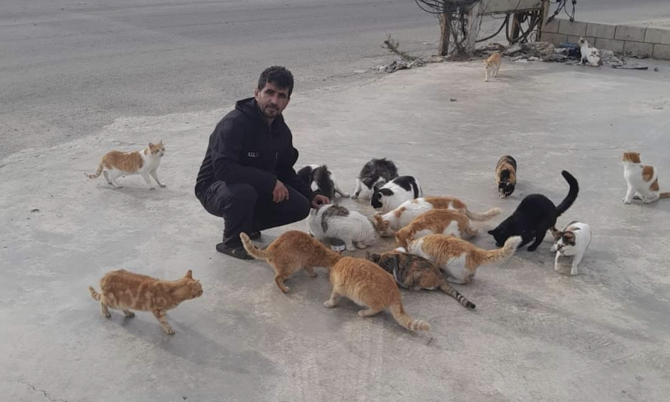BEIRUT: Three people, including two civilians, were killed in drone strikes on Sunday as the Israeli army stepped up its attacks on Hezbollah and its ally in southern Lebanon.
The first strike, near a UNIFIL site in Naqoura, killed a Hezbollah member later identified as Mohammed Baydoun.
A second Israeli drone targeted a motorcycle in Aita Al-Shaab, killing a civilian named as Rafik Hassan Kassem, and badly injuring another man, Hussein Saleh, who later died from his wounds.
Saleh, a mechanic with no political affiliations, used to travel to nearby towns to feed domestic animals left behind by owners who fled the region. Arab News had previously interviewed him.
People close to Saleh said that “everyone advised him to stop visiting border villages in fear of being targeted, but he insisted on fulfilling his humanitarian duty.”
An Israeli drone also struck Jabal Al-Blat, opposite Israel’s Zar’it settlement, targeting a transmission tower for Hezbollah’s Al-Manar TV Channel.
As hostilities between Hezbollah and Israel entered their 231st day, Khiam village was subjected to heavy Israeli raids, with military drones striking four targets.
In less than 48 hours, Israeli shelling reached the outskirts of Chihine, Majdal Zoun, Kfarhamam in Wadi Hamoul, Zebqine, and Naqoura.
Shelling subsequently reached the villages of Rachaya Al-Foukhar, Hamoul, Zebqine, Labbouneh, the Makraba forest, and the eastern outskirts of Khiam.
A fire erupted after a number of shells landed on the outskirts of Rab Al-Thalathine, near Al-Taybeh village.
Israeli raids on Aita Al-Shaab in the central sector caused serious damage to property, infrastructure and homes.
Hezbollah also announced the deaths of two people in Israeli raids on Aitaroun late on Saturday night.
One of the victims was named as Bilal Amin Mourad, a former principal in the Aitaroun public vocational school. Caretaker Minister of Education Abbas Halabi mourned Mourad’s death on Sunday.
Israeli army spokesperson Avichay Adraee said that the military struck Hezbollah targets in five regions in southern Lebanon.
He said that warplanes raided Hezbollah’s infrastructure and military buildings in Khiam and Aita Al-Shaab, adding that several areas in Khiam, Houla, Markaba and Kfarkila were also bombed.
Sirens sounded in Israeli settlements adjacent to the Lebanese border, including Shlomi, Betzet, Hanita, Ras Naqoura in western Galilee, Avivim in the upper Galilee, and Kiryat Shmona and its surroundings.
Meanwhile, missiles landed in an Israeli army site near Shlomi.
Israeli Army Radio announced that “two anti-armor missiles were launched from Lebanon toward Margaliot in the Galilee panhandle.”
The Israeli Channel 12 said “about 10 missiles were launched from Lebanon toward the Zar’it settlement in the upper Galilee, with no casualties reported.”
Hezbollah’s operations targeted “technical systems in the Israeli Al-Abad site with appropriate weapons, striking it directly and completely destroying it.”
The militant group also struck “a Merkava tank with a direct missile in the Al-Marj site, destroying it and killing and injuring its members.”
It subsequently targeted the Zibdine site in the Shebaa farms and a building for the Israeli soldiers in the Al-Manara settlement. It also hit two buildings for the Israeli soldiers in the Metula settlement and two other buildings for the Israeli soldiers in the Shtula settlement.
MP Mohammed Raad, head of Hezbollah’s parliamentary bloc, responded on Sunday to Israeli statements threatening to wage open war on Lebanon, saying: “We know your situation accurately, and we know who you are and we are waiting for you.”
In response to those criticizing the attacks in southern Lebanon in support of the Gaza Strip, Raad said: “When criminals take their crimes too far, they don’t spare anyone. That’s why we should prevent the enemy from looking for another target, so we don’t wind up being the other victims.”
Referring to the kamikaze drones used to strike Israeli targets, Sheikh Nabil Kaouk, a member of Hezbollah’s Central Council, promised further operations that will “surprise and humiliate the enemy.”
He said: “For the first time in the history of the Arab-Israeli conflict, Lebanese planes raid Israeli sites in occupied Palestine.”


























